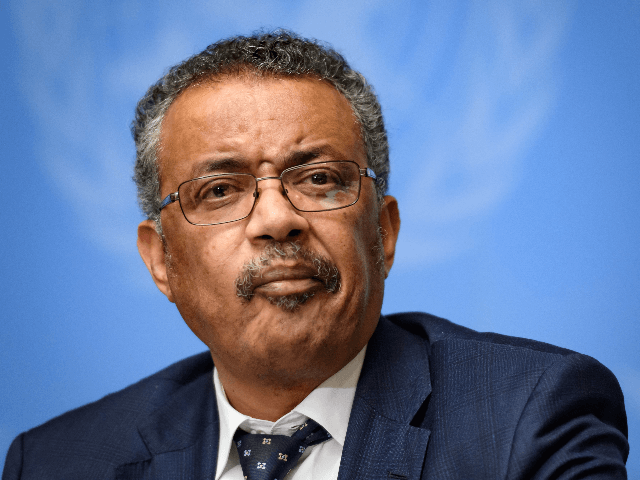The director-general of the World Health Organization (WHO), Tedros Adhanom Ghebreyesus, told reports in a briefing Tuesday that health officials in the Democratic Republic of Congo (DRC) are using testing systems developed for Ebola to test for the Chinese novel coronavirus.
Tedros made the revelation during a briefing in which he announced that the WHO was distributing coronavirus testing kits to Africa this week after Egypt confirmed the first case on the continent. China first alerted the WHO to the existence of a new virus in early January, but only alerted the public on January 20, allowing large public assemblies in which it is believed the highly contagious virus spread rapidly.
The delay also resulted in millions of Chinese leaving Wuhan, where the virus is believed to have first jumped from animals to humans, and spreading the virus worldwide.
Africa is particularly vulnerable to a mass outbreak of coronavirus because many nations have weakened or barely existent healthcare systems. Many are fighting outbreaks of other deadly diseases. Several of the most vulnerable states have strong ties to the Communist Party of China through Beijing’s Belt and Road program, which has imported hundreds of Chinese workers to build infrastructure in places like Kenya, Rwanda, and Zimbabwe.
DRC is currently in the throes of the second-largest Ebola outbreak in recorded history. As of Monday, the WHO has documented 3,433 cases of Ebola in the country and 2,249 deaths.
Warring militias fighting over natural resources in DRC have made Ebola response nearly impossible and have exacerbated outbreaks of other preventable diseases like measles.
“Some countries in Africa including DRC are now leveraging the capacity they have built up to test for Ebola to test for COVID-19 [Wuhan coronavirus],” WHO chief Tedros told reporters on Tuesday. “This is a great example of how investing in health systems can pay dividends for health security.”
He did not elaborate on how that is possible – the Ebola virus is significantly different from the coronavirus family. He also appeared to celebrate that Congo has resorted to this solution despite it clearly indicating the WHO has not yet distributed the appropriate protective materials to the control to identify the virus.
Tedros did say, “by the end of this week, 40 countries in Africa and 29 in the Americas are due to have the ability to detect” the Wuhan virus.
“Many of these countries have been sending samples to other countries for testing, waiting several days for results. Now they can do it themselves, within 24 to 48 hours,” Tedros said. “Other countries like Namibia, Nigeria and Timor-Leste are running workshops with the media to ensure accurate and reliable reporting.”
As the South China Morning Post noted, prior to the World Health Organization finally helping African countries put together the equipment necessary to test for coronavirus, only two laboratories on the continent could confirm cases: one in Senegal, and one in South Africa. Nations in between, like Kenya and DRC, would have to wait weeks to mail out biological samples and receive confirmation. The Morning Post confirmed that among the nations that the WHO has now sent testing kits to are DRC, Egypt, Nigeria, Uganda, and Cameroon, but not some of the countries most deeply involved in China’s Belt and Road Initiative like Kenya or Zimbabwe.
The Belt and Road Initiative is a global infrastructure project in which China offers predatory loans to developing countries in exchange for China building often unnecessary or onerous railways, ports, or other travel hubs. In Kenya, Rwanda, and Uganda, China is busy building the Standard Gauge Railway (SGR), which will offer high-speed service connecting several capitals. China has flooded Kenya with illegal Chinese workers, many of whom have engaged in openly racist policies like segregating Kenyan workers at work sites, forcing them to use different commuting vans or lunch cafeterias.
China is also very active economically in communist Zimbabwe, where opposition party groups are demanding a full ban on Chinese citizens entering the country. As of Tuesday, the ruling Zanu-PF party has identified 506 potential coronavirus cases, all travelers from affected countries.
Other African nations have also identified dozens of suspected cases of the novel coronavirus. The virus reportedly causes flu-like symptoms including fever, difficulty breathing, and cough. In sensitive patients, it can cause pneumonia and death.
Africa is currently fighting outbreaks of several deadly and preventable diseases including Ebola, measles, cholera, polio, and Lassa fever. These outbreaks are occurring in Subsaharan African, however, putting some distance between them and the first confirmed coronavirus case in Egypt. Egyptian authorities described the patient as a male “foreigner” but did not offer any more details. Officials reportedly identified him as a potential case through a port of entry.
At press time, global health authorities have confirmed 75,282 cases of the novel coronavirus. Of those, 74,188 cases have been documented in China. Another 2,012 people have died after being diagnosed with the virus; the vast majority of deaths occurred in China, though France, Taiwan, Japan, Hong Kong, and the Philippines have also recorded deaths.

COMMENTS
Please let us know if you're having issues with commenting.